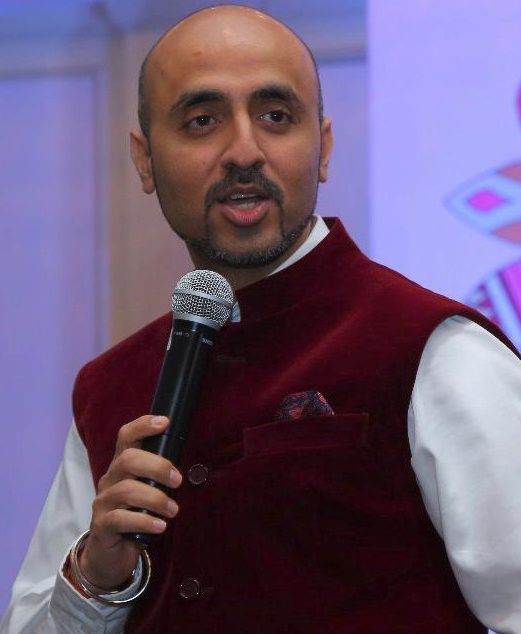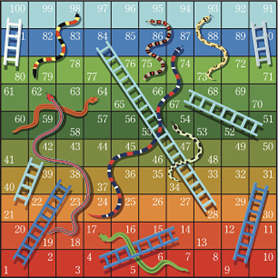- May 23, 2022
- Posted by: CFA Society India
- Category:ExPress

Written By
Manish Gvalani, CFA,
Member, Public Awareness Committee,
CFA Society India
Billionaire Hedge Fund Manager, Bill Hwang speaks over a recorded line with urgency – “Place an order for USD 10 billion worth of Viacom Shares, Now !!! “
Just imagine if you are the trader at the receiving end of the line and you have the responsibility to execute this BUY order. What all would be going on in your mind –
- How successful is Bill Hwang?
- If only I were that smart.
- He is a VVIP client of our firm and deserves all the respect and adulation.
- If only I could meet him.
- One day I will also become that rich and successful.
12 months later – Bill Hwang is staring at multi-billion dollar lawsuits for market manipulation. If convicted, he faces a maximum sentence of 380 years in prison as per US Jurisdiction.
Now, at this very moment, when you think of that USD 10 billion BUY order. Would you be going through the same emotions that you did earlier? Would you have the same respect for the man, you so admired a month back? Would you aspire to be like him in the future?
I am sure that your answers would have changed. It’s normal and understandable.
But what’s important to understand is that you, and all of us, have an innate tendency to judge people on the basis of their outer appearances i.e. clothes, cars, houses, personality, attitude, media coverage, and their circle of friends. But none of this actually speaks about the value system that the man in consideration lives by.
The outer appearance is temporary and it is just one mistake away from fizzling out. Mr. Vijay Mallya’s one mistake was Kingfisher Airlines. Nirav Modi’s one mistake was leveraging the jewelry business. R Raju of Satyam’s one mistake was telling lies about the Cash balances. Many people are just one mistake away from being brought down to ashes.
But the ones with a value system in place, do have higher standards of operating and hence have higher chances to live wholesome lives for longer lifespans. In no way, does their value system guarantee a life of zero mistakes. As it’s often said, “to err is human”. But their principled way of life ensures that the damage isn’t ruinous, and hence can be handled with some valuable lessons learned along the way.
That’s the kind of people we all hope for in the executive board rooms of the companies we own in our portfolios. But hope is not a strategy you can bet big on. And hence, you need to develop the ability to gauge one’s value system, which could take a lifetime to develop.
In spite of the time investment required, you always can start with small steps in that direction. This ability could reap dividends for life.
For e.g. I attended the live stream of Berkshire Hathaway AGM in its entirety and it was 7+ hours of coverage. It was a delight to learn from the best in the business i.e. Warren Buffett & Charlie Munger. But most importantly, Warren Buffett’s value system was oozing out of every single question he answered through the AGM.
When asked about the effects of inflation. His response was spot on “Become the best at what you do, and you will be able to command the price you desire. You will be indispensable. So the best strategy is to invest in yourself and make yourself the best in your field.”
When asked about the cash balances in excess of USD 100 billion, his response was “We will always have a lot of cash on hand. There have been a few times in history, and there will be more times in history, where if you don’t have it, you don’t get to play the next day. It’s like oxygen, It’s there all the time, but if it disappears for a few minutes, it’s all over.”
It’s these answers that reflect the thought process that goes on within the minds of seasoned investors like Mr. Buffett. I read his autobiography by Alice Schroeder and discovered his newspaper test wherein he always asks a question to himself before making choices i.e. “If what I’m about to do gets reported in the newspaper tomorrow, will it embarrass me. If yes, I will not do it. If not, I will go ahead.”
Just think of the wisdom here. It’s a potent checklist that could avoid choices that lead to catastrophic damages. This question alone would create a wall to defend against stupidity and instant gratification. But how many people have these principles in place to question their choices, especially in the heat of the moment, when the whole market is being herded in one direction, when there is peer pressure to give in.
When he was pitched an investment in Google by the founders themselves, his questions to himself were –
- Do I understand the business?
- Does the business have a moat?
- Is the management trustworthy?
- Is the price fair?
He couldn’t comfortably answer the second question and hence, passed on the opportunity to invest in Google. With hindsight bias, you might consider this as one of the biggest mistakes of Mr. Buffett. But think about the ability to question his investment decisions, before plunging in with the money.
For every successful mega-successful online stock, there have been thousands of IPOs which have languished or gone bankrupt and disappeared from stock markets. Hendrik Bessembinder had written a paper in 2017 for Financial Economics, and the statistics in this paper will not surprise you regarding Mr. Buffett’s decision to pass Google. Provided below is the abstract of the paper –

So you shouldn’t judge Mr. Buffett on his answer being NO for investing in Google. You rather judge an investor with the process he has in place before making investing decisions. Buying a stock, boasting about it, and sharing your multi-bagger returns on Twitter is very easy. The million-dollar question is – can you sustain that performance over the long haul?
There are other considerations too – Can you achieve these returns without risking ruin? Do you hold, do you buy more, do you sell, do you trim your position? There are so many decisions to be made and without a process in place, you will make a mistake that you might regret for life.
Is it a surprise that you get to read about these mistakes almost daily –
- Investors losing a significant chunk of their life savings in LUNA coins or high growth stocks
- Fund Managers being investigated for front running trades
- Relationship Managers misselling insurance policies or persuading clients for F&O trades
Charlie Munger has spoken about the Psychology of Human Misjudgments and it is a Must Watch Video on Youtube. Everyone is affected by biases and they do not even realize it. It’s these biases that make them overconfident about their choices and make them go all-in while paying no heed to the consequences or opportunity costs that come along with that very choice.
I am certain that you would like to avoid being party to this cohort that’s experiencing significant loss on their investments. That intention would require you to work on your ability to gauge the value system of the people you choose to invest with.
Value System has a broad context to them. It refers to many things at the same time i.e. vision, commitment, passion, respect, humility, caution, and curiosity. All of these in the right measure make up for one’s value system. And it’s these traits that could make efficient capital allocation a routine affair.
So how do you get better at gauging people you are dealing with, directly or indirectly?
The only solution is that you need to have a checklist that will assist you in making a meaningful observation –
- Do their actions match their words?
- Is their communication simple or complicated?
- Are their statements full of certainties and overconfidence? Or do they speak with confidence while suggesting caution too?
- Do they accept responsibility or are they washing their hands off and looking for someone to blame?
- Do they target return maximization while risking permanent losses? Or do they focus on incremental gains, one step at a time?
- Do they have the patience to get rich slowly or are they in a hurry?
- Is their lifestyle simple or do their Lambhorginis need them to make more money in any way possible?
For an analyst, quarterly con calls, management interviews, and annual reports provide a lot of signals. For an investor, an advisor’s research, demeanor, and communication speak volumes about their principles. And it may not be the first call/interview/meeting that would provide you with a strong signal, but constant practice and conscious attempt to make observations will make you better at the game.

You have to realize that you are in a Game, just like Snakes & Ladders. You will have to build a system that helps you detect the snakes that are in the game to make you part with your money. And there are many around you, some even disguised as angels waiting to get one opportunity to empty your accounts in one swing.
But you also have people around you that could contribute immensely in safeguarding your assets, educating you about the tenets of long-term investing, and compounding your savings handsomely for many years to come. Will these people also do mistakes – Yes, of course! But it won’t be fatal and they will own it up, learn from it and keep marching ahead.
And the irony is, you will have to play this game with others. It might look solo as far as your own role of screening for profitable investments goes. But you still need bankers, analysts, advisors, management, CEO, and many others to play their roles to the best of their ability.
Since there is no escaping from the game, I invite you to get better at playing it. It doesn’t need a very high IQ. All it needs is a willingness to learn every day and get better by just 1% every day.
As Benjamin Graham would say “Investing isn’t about beating others at their game. It’s about controlling yourself at your own game.”
Disclaimer: “Any views or opinions represented in this blog are personal and belong solely to the author and do not represent views of CFA Society India or those of people, institutions or organizations that the owner may or may not be associated with in professional or personal capacity, unless explicitly stated.”
About the Author
Manish Gvalani is a CFA charterholder and Masters in Finance from KJ Somaiya. He has worked in Portfolio Advisory roles across many international banks eg. SCB, Citi, and BNP Paribas. Currently he is working with Dubai’s biggest bank, Emirates NBD. He is passionate about Snooker, dabbles in bio-hacking and is a voracious reader. His favourite books are “Letters from a Stoic” by Seneca and “Snowball” by Alice Schroeder. He has a weekly newsletter called “Psychology of Investing” wherein he covers topics related to behavioural finance, long term compounding and longevity. Weblink for the same is https://manishgvalani.substack.com He lives with his wife, and parents in Dubai.
